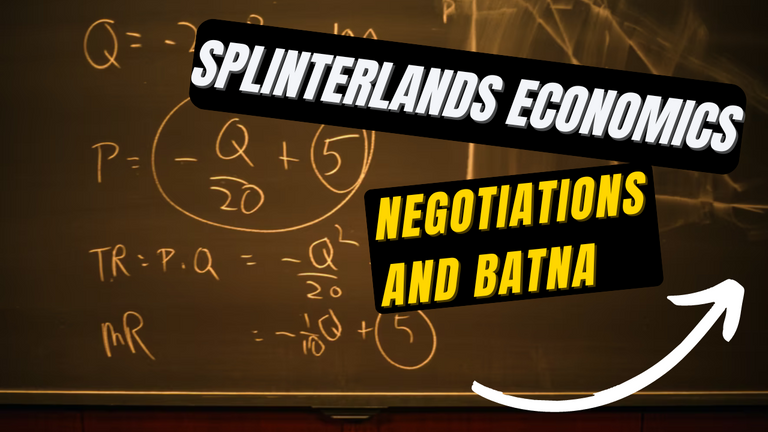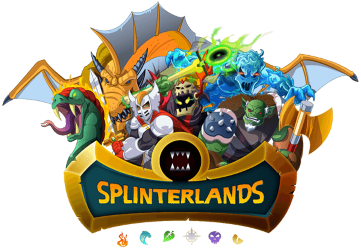Splinterlands Economics: Negotiations and BATNA
Hello everyone! We are back again today with another edition of Splinterland Economics - a series in which we introduce a basic economic concept and then apply it to Splinterlands. If this is your first time reading, just to tell you a little bit about myself: my day job is in an unrelated area but I consider myself a little bit of economics nerd - I read a little (or maybe way, way) more news than I should, double majored in econ, and am obsessed with optimization. I love the way Splinterlands is equal parts card game and resource allocation game. My goal with these articles is to share a little bit of what I know with you all.
Our subject today is a large part of how deals are set up or arranged. If you were ever curious about not only how deals get made, but also what gives certain parties greater bargaining power, then you are definitely going to want to pay close attention to this post. Today, we'll be discussing Negotiations and BATNA!

What are Negotiations and BATNA?
So today's topic is really two topics, but they are closely related enough that I did not want to talk about one of them without the other. The first topic is the one that you have probably already heard about before - Negotiations. Negotiations are what occur between two parties when there is a potential deal or transaction to be made. The key word here is potential, as a deal has not yet been made, and the point of negotiations is to determine whether a deal can, in fact, be made. Generally (though not always) if a negotiation results in an agreement then that agreement will turn out to be to the benefit of both parties - after all, if it wasn't then they would most likely not both be agreeing to it.
You may be thinking as you read about negotiations that there is potentially a wide range of deals which may be made between two parties. For example, in a sale between a buyer and a seller then there may be multiple prices at which a transaction could occur. Our second topic for today deals with an important factor in determining how favorable a negotiated agreement ends up being to each party (and yes, there are many different factors, but this is one of the big ones). BATNA is short for "Best Alternative to Negotiated Agreement", and it refers to each party's outcome should negotiations fail. As you may imagine, a party with a superior BATNA will generally have more leverage in negotiations and and negotiated agreement will likely end up being more favorable to the better BATNA.
These concepts are a little abstract, so let's take a look at a specific (hypothetical) example. Let's say that Bob wants to open up a boba shop. In order to do so Bob needs to find a place to rent for his shop, and he figures that the most he can afford to pay per month is $2500 - though less would be ideal. Sally owns a retail space that could be used as a food service location, and privately thinks that she would be willing to rent out her space for anything over $1000 per month - but she does want to receive as much as possible. Clearly, a deal could be made here - at any rental rate between $1000-$2500 then both Bob and Sally should be happy with the rental rate.
This is where Bob and Sally enter a negotiation and BATNAs come into play - the alternatives of each party determine how willing they are to be flexible and give up some of the potential gains. For Bob, his BATNA is to either find another location or to give up on opening his shop. Are there a lot of other potential locations nearby? He may be inclined to try and pay as little as possible. Or has opening a boba shop been his lifelong dream? He may want the location a little bit more and end up settling on a price closer to his $2500 maximum. Sally's BATNA is to rent the space to someone else, or to use the space for some other purpose. If the real estate market is hot or if she was privately thinking of using the space to open her own store then she may have much stronger BATNAs than if it is in the middle of a bear market or if the location has been vacant for years and she is sick and tired of trying to find a new tenant.
How do we apply it to Splinterlands?
You may be thinking "hey! I don't negotiate for anything in Splinterlands!". And it is true that peer to peer deals in Splinterlands are rare, though they certainly do occur. However, in addition to the explicit peer to peer side deals which you may arrange with other players, participating in markets - for example the Splinterlands card market or cryptocurrency markets such as Tribaldex - also involve negotiation. In Tribaldex or Hive Engine you may place an offer to buy a good (a "bid") or an offer to sell one (an "ask"). In PeakMonsters or perhaps your alternative market of interface of choice you may similarly put a card up for sale for a certain price, or place a bid on one in hopes of getting the chance to buy it at your desired price.
Even though you do not directly communicate with the other party and transactions matching bids and asks are carried out in a trustless manner, it is still a form of negotiation. Each day (or second, depending on your degree of activity), you are offered a deal or price by the market and you may choose whether to accept it or not. If you are buying then your BATNA is to instead use the money would would have spent on the purchase on alternative cards or investments. If you are selling then your BATNA is to wait another day and try to sell your card (or asset) in tomorrow's market, or to take the asset off of the market and utilize it in some way - either using it yourself, or renting it out to someone else.
It is helpful to keep an open mind while determining your BATNA, as sometimes creative solutions can help you to find a much more beneficial outcome than you were expecting. For example, in Splinterlands if you are looking to purchase or rent a specific card, then you may also want to look at the prices of alternative levels or foilings. You may even want to expand your search to other similar cards which may be able to play the same role. Doing so may help you to find a real bargain!
Why should we care?
Both in Splinterlands and in real-life negotiations, having a strong best alternative to negotiated agreement gives you more leverage and allows you to hold out for better deals. In a flea market, you are more likely to get the best deals if you are willing to walk away from an item you are thinking about selling. On the other hand, if you know that you absolutely must proceed with some some specific transaction, be it buying or selling, then you may end up having to accept a price you would otherwise rather not take. Being aware of our BATNAs helps us to be more aware of our different options, be stronger negotiators, and ultimately to make better informed decisions with our assets.
Thank you so much for reading all the way to the end. Interested in seeing some more of my writing in the future? Be sure to give me a follow! In the meantime, if you'd like to see some of my recent posts:
The Glass Cannon - Using Pelacor Arbalest in Battle! - Last week's battle challenge, featuring Mycelic Slipspawn!
Splinterlands Economics: Prospect Theory - An introduction to Prospect Theory, and how we can apply it in Splinterlands.
Splinterlands Economics: Demand - A look into Demand and how understanding it can help us in Splinterlands.
Thinking about giving Splinterlands a try but haven't signed up yet? Feel free to use my referral link: https://splinterlands.com?ref=bteim, and be sure to reach out to me if you have any questions!
All images used in this article are open source and obtained from Pixabay or Unsplash. Thumbnails borrowed with permission from the Splinterlands team or made in Canva.





Thanks for sharing! - @rehan12
